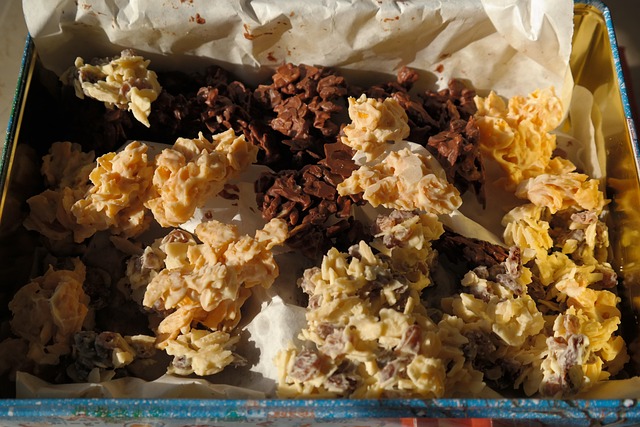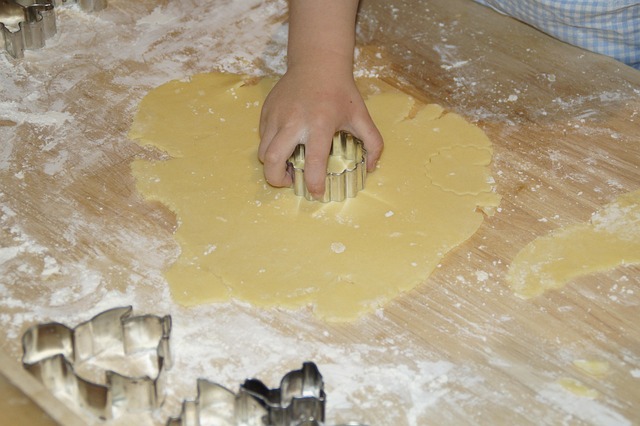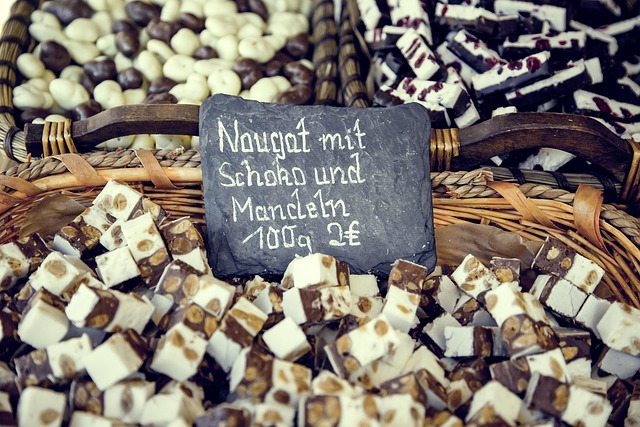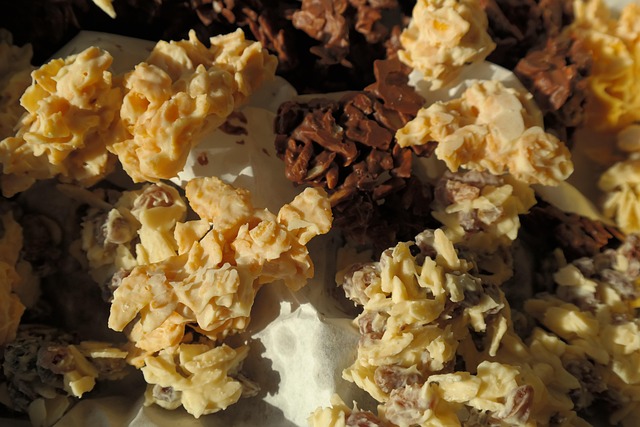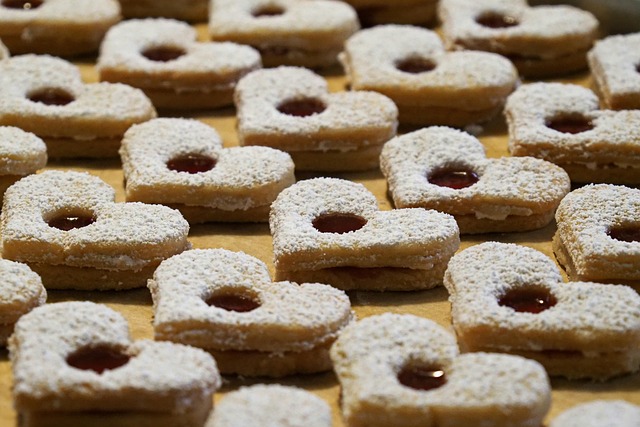Category: Specialty Cookies
Specialty Cookies: A Comprehensive Exploration
Introduction
Welcome to an exhaustive exploration of the delightful and dynamic world of specialty cookies. This article aims to guide readers through the intricate tapestry woven by these unique culinary creations, shedding light on their global impact, economic significance, technological innovations, and regulatory frameworks. From their historical roots to emerging trends, we delve into every aspect that defines specialty cookies as a vital component in the food industry. Prepare to embark on a journey where each bite reveals a world of possibilities.
Understanding Specialty Cookies: Defining the Delights
Definition: Specialty cookies, often referred to as gourmet or artisanal cookies, are baked goods distinguished by their exceptional quality, distinctive ingredients, and unique flavors. They transcend the conventional cookie, offering an elevated dining experience that captivates the senses.
Core Components:
- Ingredients: High-quality flours, pure fats (such as butter), premium sugars, and a careful selection of flavorings like spices, nuts, dried fruits, or exotic ingredients.
- Craftsmanship: Skilled artisans meticulously mix, knead, and bake these cookies, ensuring consistency in texture, taste, and appearance.
- Varieties: The range is vast, from classic chocolate chip to delicate macarons, crunchy pistachio cookies, or soft, chewy brownie cookies—each with its own distinct character.
Historical Context: The history of specialty cookies traces back centuries, evolving from simple homemade treats to refined culinary creations. In Europe, for instance, the Middle Ages saw the rise of spiced cookies as traveling companions, while the Renaissance brought about a flourishing of cookie artistry in royal courts. Today, these cookies have become a global phenomenon, celebrated in various cultures and culinary scenes.
Significance: Specialty cookies hold a special place in modern gastronomy, appealing to a wide range of consumers who appreciate quality, uniqueness, and the craftsmanship behind their food. They represent a fusion of tradition and innovation, blending familiar flavors with experimental techniques, thus creating memorable dining experiences.
Global Impact and Trends
International Influence: Specialty cookies have left an indelible mark on global food culture, transcending geographical boundaries. Their popularity can be traced across continents, from the bustling coffee shops of London to the artisan bakeries of Tokyo and the cozy cafes of Paris. This international appeal has sparked a trend of local artisans creating unique cookie varieties that reflect their regional flavors and traditions.
Key Trends Shaping Specialty Cookies:
- Premium Ingredients: There is a growing emphasis on using locally sourced, organic, and fair-trade ingredients, ensuring not only superior quality but also environmental sustainability.
- Regional Fusion: Chefs and bakers are blending traditional cookie recipes with international influences, creating hybrid varieties that cater to diverse palates.
- Miniaturization: Small, bite-sized cookies have become trendy, often presented in elegant boxes as gifts or as sophisticated appetizer options in fine dining restaurants.
- Customization: Customers increasingly demand personalized cookies, leading to custom-designed cakes and unique flavor combinations tailored to individual preferences.
- Healthy Alternatives: The rise of health-conscious consumers has sparked a trend for gluten-free, vegan, and low-sugar specialty cookies, expanding the market’s accessibility.
Regional Variations:
| Region | Distinctive Features |
|---|---|
| North America | Known for their abundance, with mass-produced brands dominating the market alongside artisan bakeries offering gourmet varieties like sugar cookie stacks and unique flavor combinations. |
| Europe | Renowned for traditional recipes, such as French macarons, Italian amaretti, German lebkuchen, and British shortbreads, often passed down through generations. |
| Asia | Features an array of intricate designs and flavors, including Japanese mochi cookies, Korean red bean-filled cookies, and Indian cardamom-spiced treats. |
| Latin America | Showcases vibrant flavors like chili and chocolate, with Mexican pan de muerto (sugar skull cookies) and Brazilian brigadeiros (chocolate truffle cookies) as popular examples. |
Economic Considerations
Market Dynamics: The global specialty cookie market is a dynamic and lucrative sector within the broader food industry. According to a recent report by Grand View Research, the market size was valued at USD 17.5 billion in 2020 and is projected to grow at a compound annual growth rate (CAGR) of 6.8% from 2021 to 2028. This growth can be attributed to rising disposable incomes, increasing demand for premium food products, and the rise of e-commerce platforms facilitating direct-to-consumer sales.
Investment Patterns: Investors are increasingly recognizing the potential of specialty cookies as a niche yet lucrative market. Startups and established bakeries alike are securing funding to expand their operations, innovate in product development, and enhance distribution networks. The focus is on creating unique flavor profiles, improving product packaging, and establishing strong brand identities to capture a dedicated customer base.
Economic Impact:
- Job Creation: The industry supports a significant number of jobs, ranging from artisanal bakers and pastry chefs to sales representatives and logistics professionals.
- Tourism Boost: Popular cookie destinations attract tourists who seek authentic culinary experiences, contributing to local economies.
- Export Opportunities: With their universal appeal, specialty cookies present excellent export potential, opening doors for bakeries to expand their reach globally.
Technological Advancements
Innovation in Cookie Crafting: Technology has revolutionized the way specialty cookies are made and enjoyed:
- Automated Baking Systems: Advanced baking equipment enables precise temperature control and consistent cookie texture, ensuring each batch meets high-quality standards.
- Ingredient Mixing and Scaling: Digital mixing systems enhance efficiency by accurately measuring and combining ingredients, reducing waste and improving product consistency.
- Custom Packaging: Modern packaging technologies offer innovative designs, extended shelf life, and attractive branding options, enhancing the customer experience.
Emerging Trends:
- 3D Printing: This technology is being explored for creating intricate cookie designs, allowing for personalized, customized cookies with complex patterns.
- Smart Ingredient Monitoring: Sensor technology tracks ingredient freshness and quality, ensuring that only premium components are used in production.
- Digital Recipe Management: Cloud-based recipe databases enable bakers to access and share recipes easily, fostering innovation and collaboration.
Future Potential: Technology will continue to play a pivotal role in shaping the specialty cookie industry, offering opportunities for:
- Personalized Production: Using consumer data to tailor cookie preferences, from flavor choices to dietary restrictions.
- Sustainable Packaging: Developing eco-friendly packaging solutions that reduce environmental impact without compromising quality.
- Global Distribution: Leveraging e-commerce and digital marketing to bridge the gap between artisanal bakeries and global consumers.
Policy and Regulation
Food Safety Standards: Specialty cookies, as with all food products, are subject to stringent food safety regulations. These include good manufacturing practices (GMP), hazard analysis and critical control points (HACCP), and specific labeling requirements for allergen information and ingredient listings.
Agricultural Policies: The sourcing of ingredients, particularly agricultural products, is influenced by trade policies and agreements that can impact the availability and cost of raw materials. Support for local farmers and sustainable agriculture practices are gaining traction, influencing the industry’s focus on regional ingredients.
Intellectual Property Protection: As specialty cookies become more specialized, intellectual property rights (IPR) play a crucial role in safeguarding unique recipes, designs, and branding. Patents, trademarks, and copyrights protect artisans’ creations, ensuring their exclusivity and market position.
Regulatory Bodies and Their Influence:
| Region | Regulatory Body | Key Focus |
|---|---|---|
| USA | Food and Drug Administration (FDA) | Ensures food safety, labels, and controls the use of additives |
| EU | European Commission | Sets food safety standards, regulates GMOs, and promotes organic farming |
| Australia | Australian Competition and Consumer Commission (ACCC) | Protects consumers’ rights, enforces competition laws, and oversees food labeling |
| Japan | Ministry of Health, Labour and Welfare | Implements food safety regulations, monitors allergen labeling, and promotes fair trade practices |
Challenges and Criticisms
Main Challenges:
- Competition from Mass Production: Large-scale cookie manufacturers can offer lower prices due to economies of scale, posing a challenge for artisan bakers.
- Shelf Life Limitations: Specialty cookies often have shorter shelf lives, requiring efficient distribution and marketing strategies to maintain freshness.
- Seasonality of Ingredients: Reliance on seasonal ingredients can lead to price volatility and supply chain disruptions.
- Health Concerns: As demand for healthier alternatives grows, balancing taste, texture, and nutritional content remains a challenge.
Criticisms and Strategies for Overcoming Issues:
- Consistency vs. Craftsmanship: Critics argue that mass production compromises the artisanal nature of specialty cookies. To counter this, bakeries should emphasize handcrafting, employ skilled artisans, and ensure quality control throughout production.
- Sustainability Concerns: The industry can address environmental criticisms by adopting eco-friendly practices, such as sustainable sourcing, packaging innovations, and reducing food waste.
- Healthier Alternatives: Developing innovative recipes that cater to diverse dietary needs while maintaining superior taste will help address health-related concerns.
- Education and Awareness: Educating consumers about the benefits of high-quality specialty cookies and their role in supporting local businesses can foster a loyal customer base.
Case Studies: Real-World Success Stories
Case Study 1: Blue Bottle Cookies (USA)
Blue Bottle Coffee, known for its craft coffee, expanded into the cookie market with its signature chocolate chip cookies. By using high-quality, locally sourced ingredients and employing traditional baking methods, they created a unique taste that resonated with customers. Their success lies in balancing their artisanal roots with modern marketing strategies, establishing a strong brand identity, and expanding through multiple channels, including online sales.
Case Study 2: Maison Du Chocolat (France)
This French luxury chocolate house offers an exquisite range of cookies, macarons, and candies. By focusing on premium ingredients and innovative flavor combinations, they have gained recognition as a leader in gourmet confectionery. Maison Du Chocolat’s success demonstrates the power of combining traditional techniques with modern presentation and packaging, appealing to both local and international customers.
Case Study 3: The Little Cookie Company (Australia)
Founded by a passion for creating unique cookie flavors, this Australian startup quickly gained popularity through their creative and customizable cookies. They offer a wide range of options, from classic chocolate chip to exotic flavors like matcha green tea and chai spice. Their success is attributed to their ability to cater to diverse tastes, utilize social media for marketing, and partner with local businesses for distribution.
Future Prospects: Looking Ahead
Growth Areas:
- Global Expansion: The rising demand for premium food products presents significant opportunities for specialty cookie brands to expand internationally, leveraging e-commerce and digital marketing strategies.
- Health and Wellness: As health consciousness grows, the development of functional cookies with added nutritional benefits will be in high demand.
- Sustainable Practices: Consumers increasingly support environmentally conscious businesses. Specialty cookie manufacturers can differentiate themselves by adopting eco-friendly packaging, sourcing local ingredients, and reducing food waste.
- Personalization: Customized cookies tailored to individual preferences will continue to gain popularity, offering unique experiences for special occasions and gift-giving.
Emerging Trends:
- Gourmet Pop-Up Shops: Temporary shops showcasing limited-edition cookie creations can create a buzz and attract customers seeking exclusive experiences.
- Cookie Subscriptions: Regularly delivered boxes of specialty cookies cater to busy individuals who want high-quality treats without the hassle of shopping.
- Collaborations with Chefs: Partnering with renowned chefs for special cookie collections will attract food enthusiasts and generate media attention.
Strategic Considerations:
- Digital Transformation: Investing in digital platforms for online sales, customer engagement, and brand building is crucial for reaching a global audience.
- Sustainable Innovation: Exploring eco-friendly alternatives to traditional packaging materials can enhance brand image and meet growing consumer demands.
- Diversifying Product Lines: Expanding beyond cookies into related products like cookie dough, ice creams, or baked goods will provide new revenue streams.
Conclusion: Baking Up a Storm
Specialty cookies have evolved from simple treats to dynamic contributors in the global food industry, captivating palates worldwide. Their rise reflects a deeper shift toward premium, artisanal, and experiential dining. As the market continues to grow, innovation, sustainability, and personalization will be key drivers. By embracing technological advancements, adhering to regulatory frameworks, and addressing challenges head-on, specialty cookies are poised to remain a delightful fixture on culinary stages for years to come.
FAQ Section: Answering Common Queries
Q: What sets specialty cookies apart from regular cookies?
A: Specialty cookies distinguish themselves through exceptional quality, unique ingredients (such as exotic flavors or premium nuts), and intricate craftsmanship. They often have a shorter shelf life and are typically produced in smaller batches to maintain freshness and consistency.
Q: Are specialty cookies suitable for everyone?
A: While specialty cookies offer a delightful experience, they may not be suitable for individuals with specific dietary restrictions or allergies. Many specialty cookies contain nuts, dairy, or gluten, so careful ingredient consideration is essential. Alternative options are available for those with special dietary needs, such as vegan and gluten-free varieties.
Q: How can I start a specialty cookie business?
A: Launching a specialty cookie venture involves several steps: defining your unique selling point (USP), creating signature recipes, securing funding, sourcing high-quality ingredients, establishing a production facility, implementing food safety practices, and developing a comprehensive marketing strategy to reach your target audience.
Q: Can technology truly enhance the taste of cookies?
A: Absolutely! Advanced baking systems, precise ingredient measurement, and innovative packaging technologies contribute to consistent quality and improved taste. Additionally, digital monitoring allows for optimal cooking times, ensuring each cookie reaches its perfect state of freshness and flavor.
Q: Are specialty cookies a sustainable choice?
A: Sustainability in the specialty cookie industry is achievable through various practices. Local sourcing reduces carbon footprints, while eco-friendly packaging and minimal waste management systems contribute to environmental responsibility. Additionally, supporting local bakeries and artisans promotes economic sustainability within communities.


